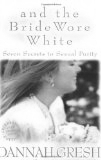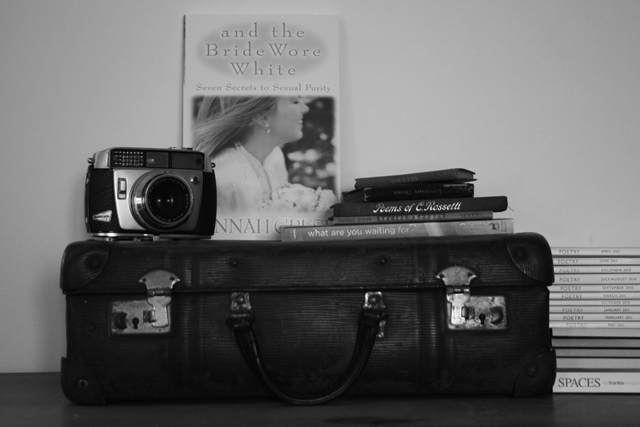of purity, secrets, and waiting
The idea of purity – especially sexual purity – has got something of a bad rap in recent decades. Society calls it a conservative cliché. Feminists see it as a hanger-on from the days when culture was balanced heavily in the favour of men. They view purity as an unhealthy patriarchal construct designed to inhibit the freedom of women.
The thing is, though, when it comes to matters of the heart, the world has changed very little since its beginning. What God said about purity has not changed in all those years, and neither has its value diminished. God’s pattern for holiness – a holiness that is not holier-than-thou but actually means set apart – transcends societal shifts and the evolution of culture. The value and worth of purity hasn’t changed, except in the vision of society.
That’s why a restatement of old truths can be so valuable. When a hundred voices are all singing a new chorus with a catchy melody, it can be hard to remember the little nursery rhyme you once lisped by heart. Dannah Gresh’s books provide a fresh look at those old truths, truths that remind us that purity is far more than merely physical. Katie and I review three of Dannah’s best-sellers here…
And the Bride Wore White:
Seven Secrets to Sexual Purity
reviewed by Danielle

Gresh does not deny that holding onto purity in an impure world can be a painful process, but she is equally honest about the pain that comes from moving into a physical relationship without the blessing of the marriage covenant. She discusses the ways in which temptation has wormed into young women’s lives since the beginning: temptation that niggles, tells us God is holding out on us, keeping us from the good stuff, or is just there to make life harder. They are ploys as old as Eden.
Gresh reminds young women that the cost of saying yes to the lordship of Christ is often found in saying no to culture’s ‘if it feels good, do it’ mentality. Feelings make a poor guide. She asks,
“Do you trust the God who made you to be a better judge of your value that the way hormonal days, bad friends, and a crazy schedule can sometimes make you feel?” (p. 79)
Gresh upholds the sanctity of marriage and the blessing of such a covenant, drawing out its symbolic richness as a picture of Christ’s relationship with His own bride, the church. At the same time, she is honest about the ups and downs of marriage and relationships. Running hard after Jesus isn’t a cure-all for the very human challenges of doing life together, for all your days, with one person.
Throughout And the Bride Wore White, Gresh’s writing is sometimes a little too syrupy for a tell-it-how-it-is reader like me. But her flowery language doesn’t negate the truth of what she is saying. Neither do her words condemn women who have made mistakes in the past or hold onto regrets because of poor choices or abuse committed against them. She speaks clearly and faithfully of the forgiveness of God and the chance for a fresh beginning. In one of the most powerful passages of the book, Gresh writes,
“You weren’t born pure. You were innocent when you were born, but Scripture says you were born sinful. So this notion that you have ‘lost’ your purity is nonsense. You never had it.” (p. 55)
This strips away condemnation for those of us who have made mistakes, and tramples down pride for those of us who are physically pure. We all need a Saviour. We all need to rely on Him for our purity. To help with this, Gresh encourages women to open up to godly older authority figures (especially parents), to confess their mistakes or sins perpetrated against them, and to continue to lean on the wisdom and advice of people who are several steps ahead in their walk.
There’s only one chapter in And the Bride Wore White which I felt was unhelpful, and that’s the chapter on making a list of attributes you desire in a future husband. The motivation is right; Gresh suggests that looking forward to a godly picture of your future can help you avoid the pitfalls associated with the temptation of brief, present pleasure. I agree. A list is helpful because it enables us to solidify what is truly worth waiting for – and, similarly, how we can be women worth waiting for. But any elements on such a list should be elements of character and faith.
Gresh’s list encourages us to write down our preferences for physical appearance and personality traits, items which in many cases are not only irrelevant but unhelpful. Getting married is not a shopping expedition – holding out until you find the perfect fit which is not only the right price but looks good on you, too – it’s so much more. Making a list like the one in this book may foster the illusion that you’re marrying a man who is perfect. Are you expecting him to get the same deal? Make a list, by all means, but focus on the lasting qualities, the ones that really do matter.
What Are You Waiting For?
The One Thing No One Ever Tells You About Sex
reviewed by Katie

Growing up in a Christian home, and then working as a youth leader with teen girls for the last few years, I’ve given my fair share of talks on purity, and read more books on it that I can count. But this book is different – it explains why we wait, how to do it, and what the Lord’s heart is on the grey issues. Although Dannah gives practical tools, she focuses more on the heart of the matter and principles to live by – mainly our relationship with the Lord and how everything flows out of that.
Personally, this book had a huge impact on my life.It is also the number one book I use with my girls outside of Scripture. And they have caught on to it so much they are buying it for their friends and I’m watching the Lord use it to change lives in our community. Because of the mature content in the book (which is handled very well), it’s probably best for girls over the age of sixteen. It would also make a great women’s small group or mother/daughter read.
Secret Keeper: The Delicate Power of Modesty
reviewed by Danielle

Today, books like Secret Keeper are just as important as ever – maybe even more so. The reason Secret Keeper is useful is that it provides an insight into the way guys’ minds – and their bodies – respond to sexual images. Gresh appeals to our modesty as an act of love to the guys we won’t marry as well as to the one we will. By choosing not to flaunt our sexuality, we preserve a healthy allure which can help guys towards maintaining their own pure thought life. Meanwhile, it instils in us a more healthy expression of our body, a gift to be given to one man, in marriage. We don’t dress modestly because the world is full of big, bad men and being immodest means horrible things happen to us. Rather, we dress modestly because this is a service to our brothers in Christ. If we care for their holiness, then we care about our manner towards them, a manner which includes our behaviour, our speech, and the way we present ourselves.
The tone of Secret Keeper is friendly and informal, never superior or judgmental. Dannah Gresh is honest about her own battles with the wardrobe and her hesitation to broach a topic which women may resent. But by appealing to the example of great women of history and culture, as well as some in-depth Bible study, she makes a compelling yet warm case for modesty. I think you’ll be encouraged.


I just found your site today and have spent some time with a cup of coffee looking around 🙂 I love these in depth book reviews. I have teenage boys and was wondering if What are You Waiting For is written to girls specifically, or to teens in general? Also, do you have any similar resources to recommend specifically for boys?
Thank you so much for the lovely, honest witness you are here in your corner of the internet!
Elizabeth! Thank you for your encouragement and for stopping by and taking the time to read some of the posts. While “What Are You Waiting For” is written primarily for girls, I think guys could really benefit from it as well. One of my girls (now all grown up) had her fiance read it, after we had gone through it, and he loved it and thought it was very good and helpful. So i do think that guys can also benefit a lot from it. In speaking to mixed groups of teenagers, I have taught on “yada” (the Hebrew word and concept Dannah bases the book on) and it’s been well received. Especially if you read through the book first, I think your sons could be encouraged through it!
Bob Gresh (Dannah’s husband) did write a book for boys that Dannah helped with, called “who moved the Goal posts” http://www.amazon.com/Who-Moved-Goalpost-Strategies-Integrity/dp/0802483313. I have not read it yet, but the reviews are all stellar.
Several other resources you can check into are: Moral Revolution by Kris Vallotton, http://moralrevolution.com/#close
and Every Young Man’s Battle by Arterburn and Stoeker. http://www.amazon.com/Every-Young-Mans-Battle-Strategies/dp/0307457990/ref=sr_1_1?s=books&ie=UTF8&qid=1390589826&sr=1-1&keywords=every+young+mans+battle
Please note, these books have come highly recommended to me by other youth leaders and men who work with teenage guys, but I haven’t had a chance to personally review them. (They are near the top of the list now!)
Hope that is helpful! Blessings!
Thanks, friends. Keep spreading the word about purity. I needed to hear theses words today. Feeling low. Headed out to do five events in five cities (Michigan and Ohio) and somehow feel really empty. Sometimes you have to lean on the friends around you for courage! Thanks for being courageous for me today.
Thank you so much for dropping by to leave a comment. Thank you even more, though, for your legacy of faithfulness to women across the world. It’s a priceless ministry, and a huge job. We appreciate it so much! Prayers for energy and joy in the busy days ahead of you. xx
I’ve been curious about Dannah Gresh’s books for a long time, so I really appreciate your reviews. Thank you so much for sharing and giving me an idea of the vision that each books presents. I’m excited to read more now! 🙂
Great reviews and amen to this:
“Gresh reminds young women that the cost of saying yes to the lordship of Christ is often found in saying no to culture’s ‘if it feels good, do it’ mentality. Feelings make a poor guide.”
It’s so important to make rational, well thought out decisions instead of using feelings as our guide.